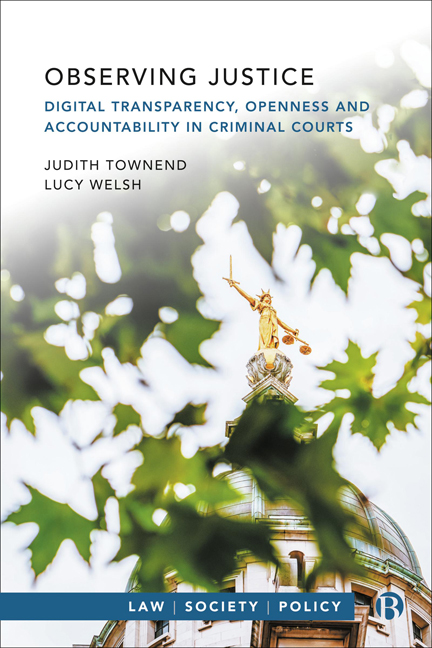Book contents
- Frontmatter
- Contents
- Series Editor’s Preface
- About the Authors
- Acknowledgements
- ONE Introduction: Why We Need to Rethink Approaches to Open Justice in the Criminal Courts
- TWO A History of Accountability in Criminal Courts
- THREE Justice System Modernisation, Digitalisation and Data
- FOUR The Role of the Public and Media in Observing Justice
- FIVE The Human Impact of Justice System Transparency
- SIX Conclusion: Towards a New Framework for Justice System Accountability
- References
- Index
ONE - Introduction: Why We Need to Rethink Approaches to Open Justice in the Criminal Courts
Published online by Cambridge University Press: 28 March 2024
- Frontmatter
- Contents
- Series Editor’s Preface
- About the Authors
- Acknowledgements
- ONE Introduction: Why We Need to Rethink Approaches to Open Justice in the Criminal Courts
- TWO A History of Accountability in Criminal Courts
- THREE Justice System Modernisation, Digitalisation and Data
- FOUR The Role of the Public and Media in Observing Justice
- FIVE The Human Impact of Justice System Transparency
- SIX Conclusion: Towards a New Framework for Justice System Accountability
- References
- Index
Summary
This book is about the principle and practice of open justice in criminal courts in what is often characterised as the ‘digital age’. By this we mean the way in which court hearings and information about cases are made publicly accessible in the context of digital and technological advances in the 21st century.
Publicity of court proceedings is deep-rooted in English and common law tradition, with the earliest articulations of open justice found in 17th century legal history (Robertson 2012). The late 18th and early 19th century philosopher Jeremy Bentham is often quoted to explain the rationale for open courts: ‘Publicity is the very soul of justice. It is the keenest spur to exertion and the surest of all guards against improbity. It keeps the judge himself while trying under trial’. From another perspective, however, in the words of a former criminal defendant speaking in the early 21st century: ‘publicity is a life sentence and it makes it very difficult for you to put it behind you and move on […] with your life and build a home and get on with everything, when it’s a click away from people’.
The second perspective has not been given such credence; and the impact of publicity on individuals and communities (with notable exceptions) is surprisingly under-interrogated in academic and policy literature. This book is motivated by a desire to provoke further discussion about this and other tensions surrounding open justice; and informed by the dilemmas and obstacles we have encountered in our own work when trying to access information about the courts.
These concerns include our inability to obtain basic information about cases (especially in the local Magistrates’ court during the first national lockdown of the COVID-19 pandemic); our nagging concerns about the ‘human impact’ of digitised courts data (such as the impact on private lives and on the relationships between court participants) and inequality of access to the justice system (including practical issues with participation that undermine understanding and engagement); and the confusion and inconsistency characterising justice system data management within and beyond England and Wales.
It is also written to encourage law and policy makers to take a deeper and more pragmatic look at how open justice impacts human lives.
- Type
- Chapter
- Information
- Observing JusticeDigital Transparency, Openness and Accountability in Criminal Courts, pp. 1 - 11Publisher: Bristol University PressPrint publication year: 2023

